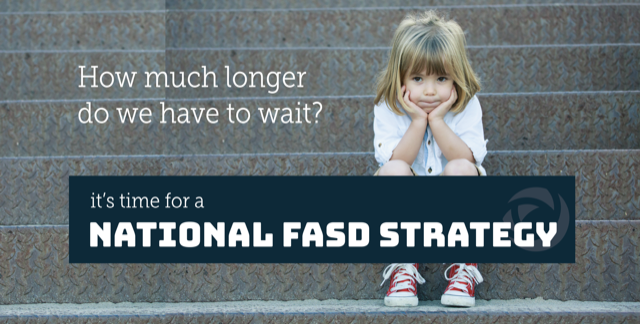CanFASD has been working hard to encourage the Federal Government to develop and fund a National FASD StrategyFASD is a complex disability. Canada needs a coordinated plan for FASD prevention, intervention, and diagnosis. That’s where a National FASD Strategy comes into play.
FASD Month is a great opportunity to bring attention to FASD and raise awareness of this important disability. Help us celebrate FASD month by encouraging your local government representatives to create national support for FASD initiatives. Ask your Member of Parliament to support a National FASD Strategy this September.
“We are in desperate need for a National FASD Strategy to support the 1.5 million Canadians with FASD and their families, and improve prevention efforts and diagnostic capacity for this disability. This is a Canada-wide issue that needs a Canada-wide response.”
Audrey McFarlane, Executive Director, Canada FASD Research Network
What is a National Strategy?
A National FASD Strategy is a plan or roadmap that gives leaders and communities direction about how to best support people with FASD, their families, and pregnant and parenting couples across Canada. A National Strategy would give us a coordinated approach to addressing FASD in Canada, which will improve FASD prevention, intervention, and diagnostic efforts across the country.
Get involved
In honor of FASD Month this September, reach out to your local government representative. Don’t know where to start? That’s okay! Fill out this form and we will connect you with your Member of Parliament and give you some talking points to focus on!
Express your support for a National Strategy on social media and at events. Encourage your friends, family, and other community members to connect with their Member of Parliament. The more people that get involved, the more likely our leaders are to pay attention to this important issue.
Why do we need a National Strategy?
FASD is a complex disability and the impacts intersect with many different sectors. The FASD community relies heavily on both informal and formal supports, whose effectiveness and availability are dependent on the knowledge of FASD across professions and within communities.
People with FASD deserve to have supports that reduce the risk of mental and physical health challenges, substance use, child welfare involvement, and interaction with the criminal justice system. They deserve provide opportunities for improved health and wellbeing, stable employment, safe housing, healthy relationships, and meaningful contributions withing their communities.
Women deserve good information and support to reduce alcohol use in pregnancy and receive non-stigmatizing, trauma informed and holistic supports for other health issues.
Caregivers deserve evidence-based information and practices to best support their child. They need a skilled workforce, trained in FASD, that is prepared to effectively address their child’s unique needs. They also deserve supports and services to improve their own mental health and wellbeing in the face of the unprecedented levels of stress they experience.
Join CanFASD this FASD Month as we collectively work towards an inclusive and accessible country for all! Check out our resources on this topic:

